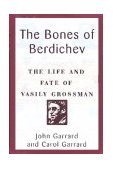The Life and Fate of Vasily Grossman
by John Gordon Garrard and Carol Garrard
(Courtesy: “AMAZON”)

From Publishers Weekly
Legendary WWII Soviet correspondent Vasily Grossman (1905-1964) covered the battles of Stalingrad and Kursk and advanced westward with the Red Army in its drive to Berlin. As he moved across liberated Soviet territory, he came upon the mass graves of Soviet Jews exterminated by the Germans. His accounts of these discoveries as well as of Treblinka and Majdanek made him the first journalist to chronicle the Holocaust, note the authors. The event that caused him to confront his Jewishness was learning that one of the 20,000 Jews annihilated at Berdichev, where Grossman was born, was his mother. The authors (Inside the Soviet Writer’s Union) use mainly newly available archival material to show that the Holocaust actually began in the Soviet Union, before the death camps of Poland; that the German Wehrmacht was complicitous in the war against the Jews; that collaboration by the Ukrainians with the Germans against the Jews was widespread. This impassioned, meticulously researched story also tells of Grossman’s failure to publish his fiction accounts (e.g., Life and Fate) of the war years. The authors break new ground in showing how a single Soviet Jewish journalist came to show the similarity between the totalitarian Nazi and Soviet states.
From Booklist
Soviet Jewish writer Vasily Grossman’s modest reputation in the West is due to the fact that toward the end of his life (1905^-64), he was effectively transformed into a nonperson by nervous Soviet authorities, and his major works were suppressed. No mere observer, Grossman participated in the most terrible events of this century: World War II, the Holocaust, and Stalin’s reign of terror. He spent more than 1,000 days with the Red Army at the front during its struggle against the Germans from 1941 to 1945. It was Grossman who first documented the Holocaust, publishing accounts as early as 1943. Grossman’s role as a patriot changed after the massacre of 30,000 Jews in his hometown of Berdichev in 1941 by the Nazis with the help of Ukrainian soldiers. His mother was one of the victims. Grossman’s account of Soviet complicity in the extermination of Russia’s Jews was hidden by the Communist Party for almost 50 years. The Garrards’ revealing biography is based primarily on archival and unpublished sources that have become available only since the collapse of the Soviet regime. Grossman witnessed firsthand much of this century’s cruelty and evil; the Garrards have given this nonperson a new life. George Cohen
